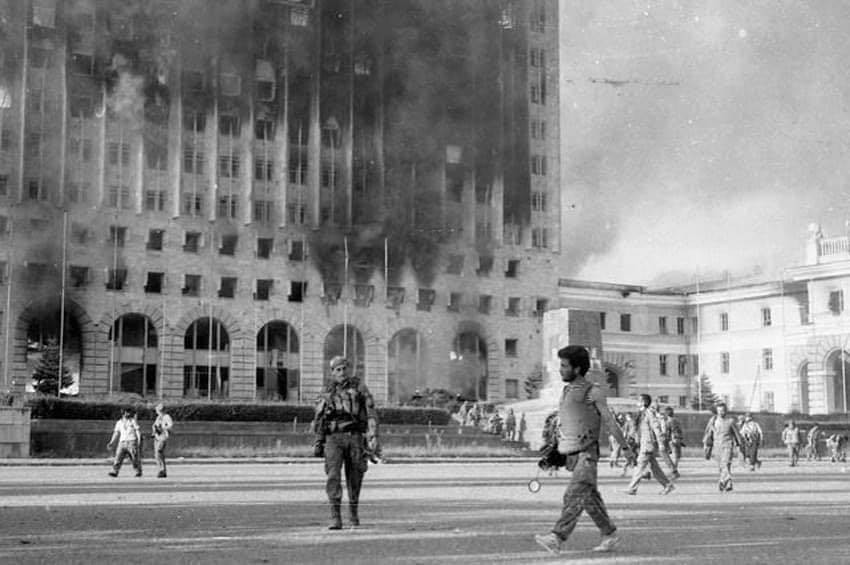საერთო ცხელი ხაზი +995 577 07 05 63


27 years have passed since the war in Abkhazia in 1992-1993. The war brought death, suffering and disappointment to both sides. We were left with hundreds of refugees after the war, who still live under grave social and economic conditions and who unfortunately suffer marginalization even in their own country. The rights of the Georgians living in Gali are limited and their social conditions are also intolerable. They are forced to live in a constant state of emergency, where their lives, freedoms, identities and ownership rights are substantially threatened. The passionate attempt of the Abkhazian political elite to create an independent political and economic system has proved to be fully dependent on Russia, both financially and politically, and it is becoming almost impossible now for them to free themselves from this attitude and from Russification. Poverty, corruption and crime prevail in today’s Abkhazia and the local population has no basic guarantees of security or development. The unhappiness about dependence on Russia and the subsequent social and political situation is openly articulated within the rhetoric of the artistic and political circles of Abkhazia. It is obvious that the existence of Russian military and political powers on the occupied territories makes it difficult also for Georgia to lead any independent politics in the area, since the occupation by Russia has become a tool for influencing the political decisions and development of our country.
It has been a long time since the war; yet, we still have no significant improvement in the way of creating the necessary legislative instruments for supporting a more democratic policy based on human rights and prosperity. Weak democracy, poverty, unequal treatment of minorities and the socially non-inclusive atmosphere essentially undermines any opportunities for transformation of the conflict and for increasing the involvement of, and links with Georgia in the occupied territories.
Even 27 years later we still have not considered critically the real reasons for this ethnic and political conflict. Besides acknowledging the impact of Russian interests, and Russia's support and participation in the war, it is important that we should raise questions about the mistakes of our political elites and their ethnocentric, chauvinistic policies, which sacrificed the lives of common people on both sides and separated us one from another. The first and inevitable step on the way of transformation of the conflict is to analyze the history critically, and acknowledge mistakes on both sides – this step has to be taken on both sides. Otherwise, an unexamined history and trauma could evolve into a rationale for reiteration, and may trap us in a vicious circle. It is important that the Georgian Government create today the discourse of peace, reconciliation and recovery of trust alongside the policy of ending the Russian occupation. However, the steps the government takes along this path are fundamentally weak. Unfortunately, the policy related to the regions of conflict is given a relatively low priority within the government and tends to acquire a rather formal character.
Sadly, the existing foreign political situation also inhibits the desired weakening of Russian influence and the creation of independent political agendas on both sides, agendas which would address issues of real public interest. We are deeply convinced that without the Russian influence, our two societies would acquire a considerably greater aptitude for uncovering common interests, for which they can both find sufficient commonalities of experience, history and tradition upon which they can build.
It is essential to understand that war is a weapon in the hands of the elites and privileged groups, used for fulfilling their own interests, in support of which they often concoct their desired stories and myths. Meanwhile, peace is surely in the true interests of the people, since it is the prerequisite for development. It is in times of peace when people can think critically, engage in dialogue, define real interests and ideals and fulfil them.
We call upon the people and social groups on both sides of the conflict, to take up the yoke of critically analysing this conflict and of requesting a policy based on our real needs, interests and ideals. We are confident, that this thought will bring us to creating a democratic, egalitarian and sympathetic society and political unity. Unfortunately, the government policy and decisions today are too weak and illusionary for conducting this process. Besides, there are resources and power, which social groups on both sides of the conflict ought to find within themselves. Moreover, it is impossible to build a peace and a dialogue, which is vertically managed by senior official bodies. It requires our joint efforts for cultivating multilateral dialogue and solidarity between the Abkhazians, Ossetians, Georgians and other ethnic groups living in Georgia.
The website accessibility instruction